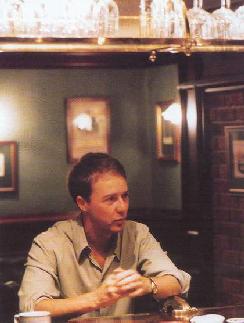
This is a long stretch of interviews.
Edward Norton: Oh, this is nothing.
What was the longest youíve ever gone through?
Edward Norton: Five times this. In the United States, when they have a press junket the first day you do
85-minute television interviews. This is a walk in a park.
Youíve been jumping from a table to table here, it seems that everybody here really wants to talk
to you, the famous actor.
Edward Norton: I donít know. If I thought people were sitting down to talk because I was famous, I wouldnít do
it. I donít think itís really worth anything. But I donít think thatís why people are here, it is a
film festival and I think people are here because people are interested in films and love films. I
think thatís whatís nice about a smaller festival like this as opposed to Cannes, which doesnít
seem to be about films at all. It seems to be much more about that other thing, but thatís why
Iíve never gone. And this seems that itís about people coming to talk about films and the only
reason I do this is because people are enthusiastic, too. And thatís the only reason why I do it,
because I love films too, I like talking about films.
Do you have a favorite character?
Edward Norton: I couldnít really pick one. You get involved with each one, I can really focus on whatever Iím
doing. I havenít seen very many movies after Iíve done them, after they come out.
Because youíre worried about the result?
Edward Norton: No, no, no, because Iím finished. Iíve experienced it. Iíd say my favorite - Iíve never been in a
film that I was really unhappy about. I think they come off at least pretty well and at least some
of them. I thought Larry Flynt was an exceptional film and The Fight Club. The Fight Club was
probably my favorite film that I was in, as a piece of cinema. I think David Fincher, in my
generation, is one of the top cinema artists, I think heís like a sculptor. He is doing things with
the medium that are actually new, if thatís possible.
What defines you as an artist?
Edward Norton: I wouldnít comment on this question. I donít know. I think all you can ever do if you are true to
your own internal indicators and not what other people are saying on the outside is follow
themes of stories that interest you. Iíve been very lucky that Iíve gotten to work on very
different sorts of things but my favorite films that I worked on, probably at the end of the day
have been on some levels exploring things that are dysfunctional in the culture that we live in.
Where is this coming from, this interest of yours in dysfunctional issues?
Edward Norton: Story telling at its core is, I think, our way of collectively analyzing ourselves. Itís a way of
seeking out meaning. Since everyone was in caves I think people have been telling each other
stories to try to get at the root of certain truths about all of us and certain things that connect
us. And sometimes naming things that are unhealthy has a very cathartic effect. In this country,
you have this amazing example when President Havel came out and delivered his New Yearís
address, after years and years of Communist leaders saying that the country was prosperous
and flourishing. Catharsis is important. Itís always amazing to me when the critical community
say, they act as though the film itself is the thing thatís unhealthy for examining something
thatís unhealthy when in truth I think itís essential.
Have you always wanted to be an actor since you were little?
Edward Norton: Iíve been doing it since I was little. I think there is a point in your life when you have to make a
decision whether thatís something that youíre really going to do and I donít think I knew in an
adult way that I was necessarily going to do it.
What made you go for that direction in life?
Edward Norton: I kept ditching opportunities to do everything else.
Will you continue directing movies?
Edward Norton: I donít know, Iíll certainly direct movies at some point. I donít have any immediate plans to do
it and I think it would be really fun to do one that Iím not acting in because it would be a little
bit more relaxed.
Youíre now working on a film with Robert DeNiro and Marlon Brando, The Score. Howís it to
work with icons like that?
Edward Norton: Itís been great. Iím about half way through. They are both terrific. Marlon has a fairly small
part in it, but DeNiro is phenomenal. He is like breathing through oxygen, he is so good, so
good, heís real minimalist. He is all gesture-if he could get rid of the words, he would get rid of
the words.